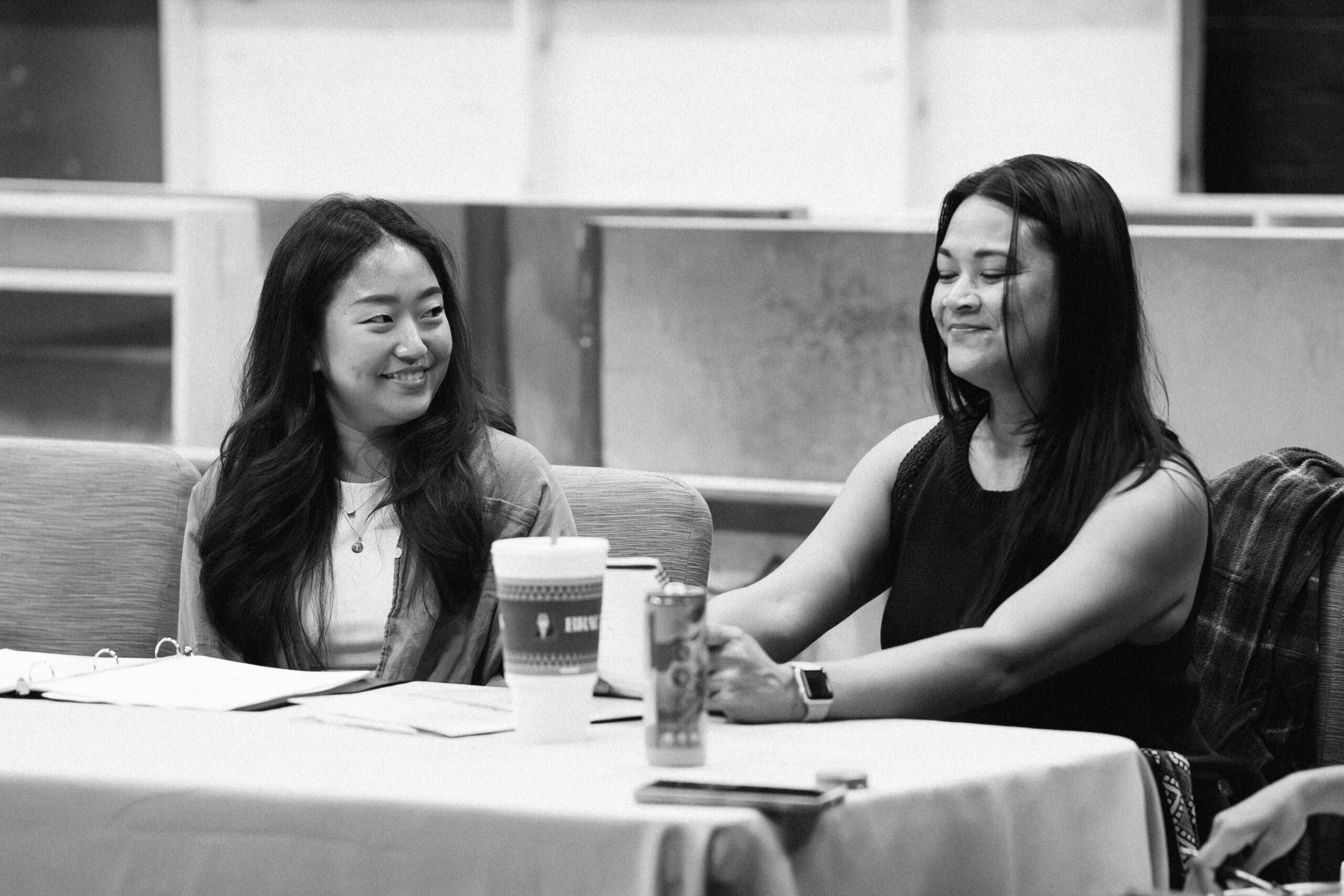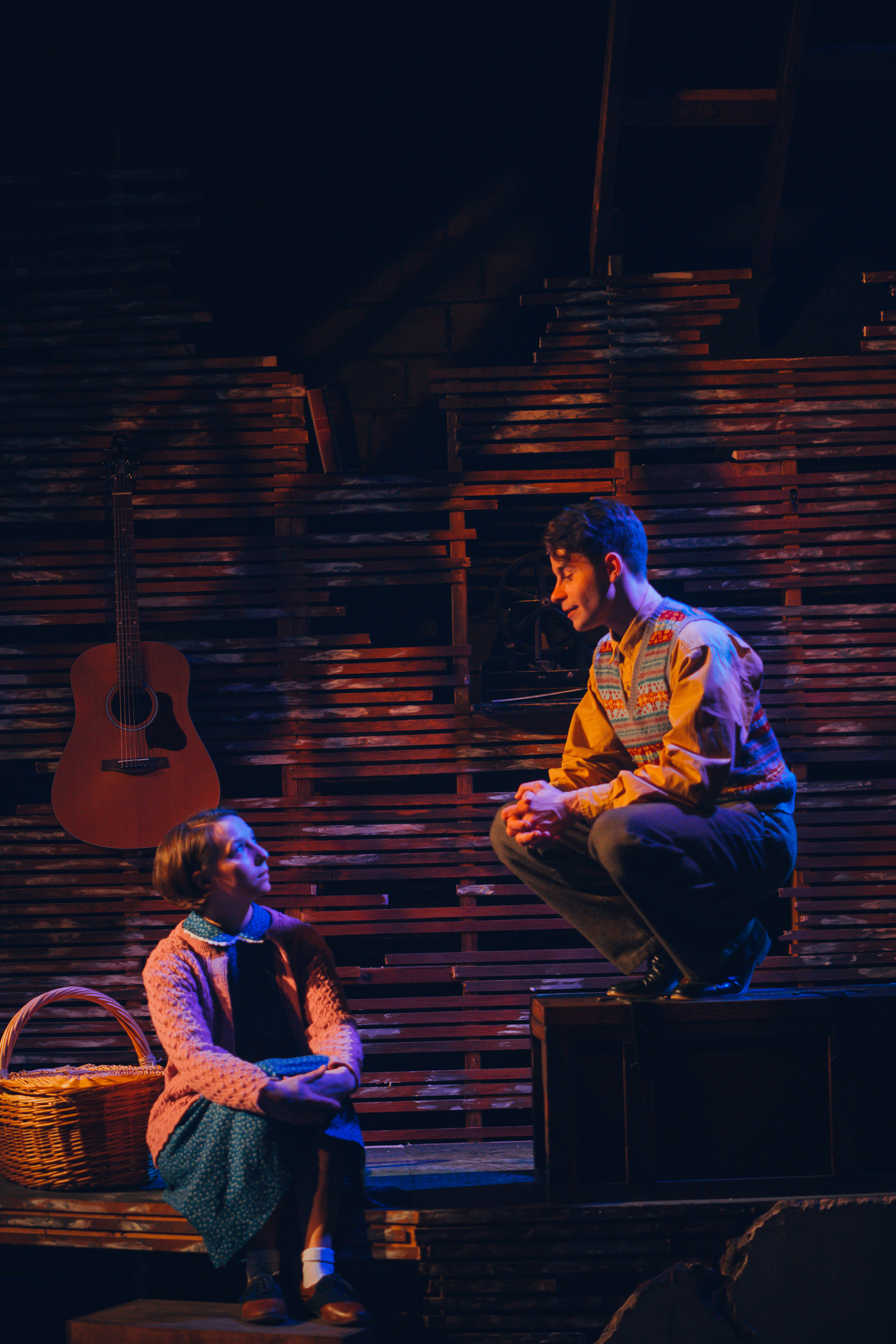Originally posted on Theater Jones.
Fort Worth — When you walk into the building to see Hans & Sophie in its world premiere at Amphibian Stage, in the lobby you’ll first notice huge signs hanging from the scaffolding, with resonant words written by historic human rights advocates, reminding us all that silence in the face of injustice is collaboration with the criminal.
Inside the darkened intimate arena theater, we find our seats on three sides of an entire wall of worn brick and wood lathing given over to exquisite life-size projections of the forests and city streets and rooms inhabited by the German brother and sister beheaded by the Nazi regime for their courageous resistance activities during World War II. It’s theater at its white-knuckled best.
The trio of artists collaborating on this illuminating work, drawn from At the Heart of the White Rose, Letters and Diaries of Hans and Sophie Scholl, edited by Inge Jens, are lead playwright Deborah Yarchun, playwright Sean Hudock, and director/playwright Illana Stein. (See our interview with director Stein.)
Scenic designer Jeffrey Stanfield, together with projection designer Driscoll Otto and lighting designer Kenneth Farnsworth, pull us into the scene, both literally and figuratively. The single table sitting center stage holds a suitcase, a symbol of escape and the literal vessel of dissent to carry the leaflets they print up on their hand-cranked duplicating machine. The truth they have learned about Hitler’s evil “elimination of the useless” is carried to cities all over Germany, from Munich, where they are students, to Stuttgart and Frankfort, and Oxford in England. The siblings practice a lie to tell curious authorities about why they are carrying a suitcase: “I am visiting my parents.” Both their mother and father opposed Nazi policies, and the offspring come to see why.
We first meet brother and sister as enthusiastic members of the Hitler-Jugend, the Nazi youth group for fascists in training. Hans (Hudock) marches in the woods with other boys shouting their motto, “Blood and honor!” Sophie (Rebekah Brockman) joins the League of German Girls, but admits to Hans that the other girls tell her she doesn’t look anything like the blonde girl in the Hitler posters.
In a few swift scenes, we look on as these smart, sensitive young people are thrown into a totalitarian state, and quickly learn what’s really going on in the front lines, and the truth about the Nazi’s murderous concentration camps.
Early on, young Hans is charged with “immorality” for his “friendship” with another boy, who reported him. Later in the play, Hans assures Sophie that, as the leader of the White Rose Nazi resistance movement at the university, he knows how to paint graffiti in the middle of the night without detection. “My life has been spent hiding secrets,” he says. Another strength of this insightful play is the clear implication of Hans’ homosexuality, and how his experience helped him relate to the Jews and “useless” people the Nazis earmarked for extermination. Although the brother and sister have been memorialized in books, opera and monuments in Germany, references to Hans’ sexuality are mostly omitted because his surviving sister originally edited his letters and diaries to be sure his radicalization was not attributed to something other than a love of freedom.
The beautifully realized script allows Hans and Sophie to speak in their own words of all the things going on in their lives and hearts. The dialogue between the two is as fresh and immediate as an overheard conversation. Their love of Thomas Mann and Goethe and other Romantic German poets inspires us as much as their reading fires them with the love of freedom.
Hans and Sophie are not intentional martyrs. They know the risks involved in what they’re doing, and they are not simply venting their anger and frustration on Twitter. They want to act for what they believe is right, and they want to live. But they don’t want to live in a state where they must pretend they cannot see visible destruction and human atrocities. Hans write on a leaflet, “We are your bad conscience; we will not be silenced.”
The two-hander comes alive because the actors envelop us in the chemistry they create together. Hudock and Brockman are charming and vivid as individuals, and heart-wrenching as a brother and sister with a loving connection, both spiritual and historical. They argue with each other, they talk about their parents together, they challenge and dare each other in their quests, sometimes literally chasing around the stage in a game of tag or seeking via a letter a push-back to an idea or scheme. Most of all, they love each other and depend on one another in the easy way of longtime friendships.
Hudock’s Hans is a young man of extremes. He is still and thoughtful at one moment, telling his sister of the sad encounter he had with a Jewish child on the way back from the Eastern front. Or he is speeding onto the scene, energized by the latest pamphlet he’s written and readied for Sophie to pack up and spread the word. At one point they circle the stage, delivering newly printed copies on the front rows.
Brockman’s bright, mischievously smiling Sophie has the fresh-scrubbed look of a school girl, and the grace of a dancer, whether scrambling up a staircase or sitting down to a piano to play the delicate opening chord of a Bach prelude. Sometimes she praises and sometimes she scolds her big brother, but ultimately the two stand together against an evil they both cannot abide.
We know what the outcome of this story of courage will be, and the end is breathtakingly swift. The play is powerful because Hans and Sophie are such dynamic, risk-taking, committed young people, laying it on the line for what they believe. They would be heroes in any human society, and their idealism and valor feel especially powerful in our own politically divided times.
The piercing scenes of this remarkable play will stay with you much longer than the show itself, and remind you that the mantra “silence equals complicity” is still not ready to be retired.



